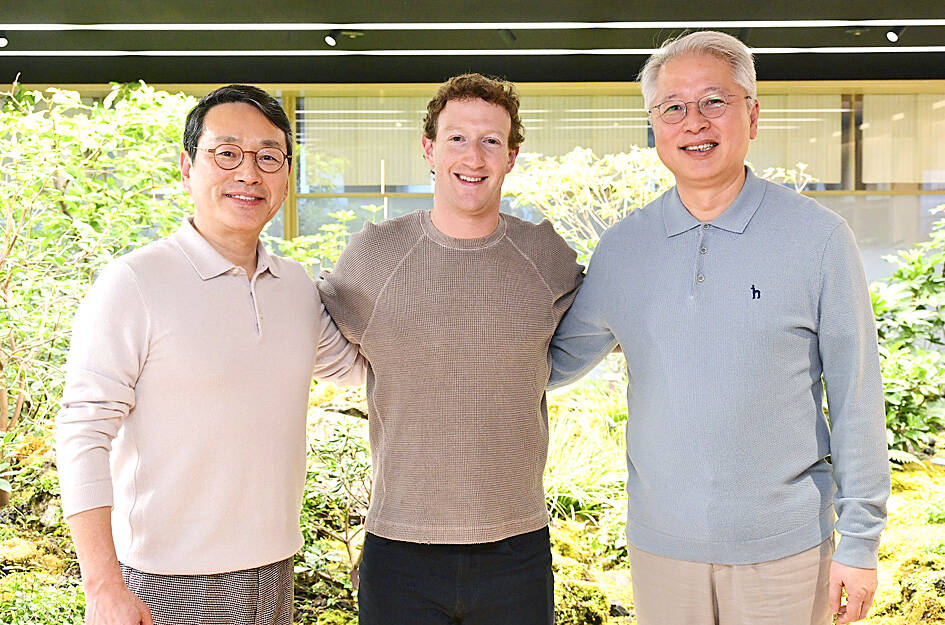Mark Zuckerberg yesterday discussed ways to deepen Meta Platforms Inc’s strategic alliance on extended-reality (XR) technology with LG Electronics Inc, during his latest stop on a tour of Asia that has taken the billionaire founder from Tokyo to Seoul.
Zuckerberg and LG Electronics CEO William Cho spent two hours going over business strategies for XR devices, considered a next phase after early virtual and augmented reality devices such as Meta’s Quest headset.
The pair also discussed Meta’s large language models and the potential to build artificial intelligence (AI) into consumer devices, LG said in a statement.

Photo: LG Electronics via AP
The South Korean company mentioned in particular how Meta’s platform could dovetail with LG’s content and TV business to create a “distinctive ecosystem.”
Zuckerberg is in Seoul after spending several days on a ski trip with his family in Japan. The Meta CEO met Japanese Prime Minister Fumio Kishida on Tuesday and discussed a broad range of topics, including the status of AI’s technological advancement and the risk surrounding generative AI, top Japanese Chief Cabinet Secretary Yoshimasa Hayashi told reporters yesterday.
AI and Quest have featured heavily on Zuckerberg’s agenda so far, given Meta’s accelerating investment into AI and growing competition in hardware from the likes of Apple Inc’s Vision Pro. In South Korea, he is expected to meet up with Samsung Electronics Co, a longtime rival of LG that has also collaborated with Meta on virtual reality (VR).
Zuckerberg, who arrived in Seoul late on Tuesday, is attracting outsized attention during an Asian tour that has largely remained under wraps.
The billionaire is returning to the city as Meta, whose businesses range from Facebook to Instagram, races to compete in AI with powerful competitors from OpenAI and Microsoft Corp to Alphabet Inc. It is an undertaking that requires huge amounts of Nvidia Corp chips and investment to build what Zuckerberg has dubbed a “massive compute infrastructure.”
Meta remains far and away the industry leader in VR headsets — holding nearly half the market, according to Counterpoint Research — but is losing money on that venture and now has to contend with Apple’s latest device.
It is unclear if mainstream consumers would ever fully embrace the products.
Zuckerberg’s next stop is India, where he is slated to attend the prewedding celebrations of billionaire Mukesh Ambani’s youngest son. The three-day festivities, which are to start tomorrow, are expected to draw celebrities in business, technology and entertainment.

SEMICONDUCTORS: The German laser and plasma generator company will expand its local services as its specialized offerings support Taiwan’s semiconductor industries Trumpf SE + Co KG, a global leader in supplying laser technology and plasma generators used in chip production, is expanding its investments in Taiwan in an effort to deeply integrate into the global semiconductor supply chain in the pursuit of growth. The company, headquartered in Ditzingen, Germany, has invested significantly in a newly inaugurated regional technical center for plasma generators in Taoyuan, its latest expansion in Taiwan after being engaged in various industries for more than 25 years. The center, the first of its kind Trumpf built outside Germany, aims to serve customers from Taiwan, Japan, Southeast Asia and South Korea,

Gasoline and diesel prices at domestic fuel stations are to fall NT$0.2 per liter this week, down for a second consecutive week, CPC Corp, Taiwan (台灣中油) and Formosa Petrochemical Corp (台塑石化) announced yesterday. Effective today, gasoline prices at CPC and Formosa stations are to drop to NT$26.4, NT$27.9 and NT$29.9 per liter for 92, 95 and 98-octane unleaded gasoline respectively, the companies said in separate statements. The price of premium diesel is to fall to NT$24.8 per liter at CPC stations and NT$24.6 at Formosa pumps, they said. The price adjustments came even as international crude oil prices rose last week, as traders

POWERING UP: PSUs for AI servers made up about 50% of Delta’s total server PSU revenue during the first three quarters of last year, the company said Power supply and electronic components maker Delta Electronics Inc (台達電) reported record-high revenue of NT$161.61 billion (US$5.11 billion) for last quarter and said it remains positive about this quarter. Last quarter’s figure was up 7.6 percent from the previous quarter and 41.51 percent higher than a year earlier, and largely in line with Yuanta Securities Investment Consulting Co’s (元大投顧) forecast of NT$160 billion. Delta’s annual revenue last year rose 31.76 percent year-on-year to NT$554.89 billion, also a record high for the company. Its strong performance reflected continued demand for high-performance power solutions and advanced liquid-cooling products used in artificial intelligence (AI) data centers,

SIZE MATTERS: TSMC started phasing out 8-inch wafer production last year, while Samsung is more aggressively retiring 8-inch capacity, TrendForce said Chipmakers are expected to raise prices of 8-inch wafers by up to 20 percent this year on concern over supply constraints as major contract chipmakers Taiwan Semiconductor Manufacturing Co (TSMC, 台積電) and Samsung Electronics Co gradually retire less advanced wafer capacity, TrendForce Corp (集邦科技) said yesterday. It is the first significant across-the-board price hike since a global semiconductor correction in 2023, the Taipei-based market researcher said in a report. Global 8-inch wafer capacity slid 0.3 percent year-on-year last year, although 8-inch wafer prices still hovered at relatively stable levels throughout the year, TrendForce said. The downward trend is expected to continue this year,